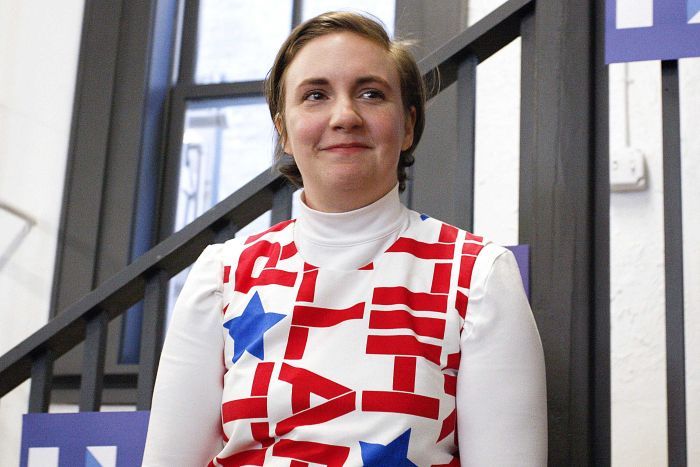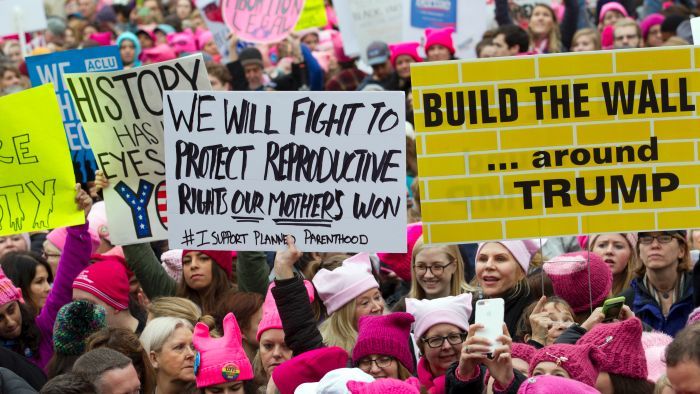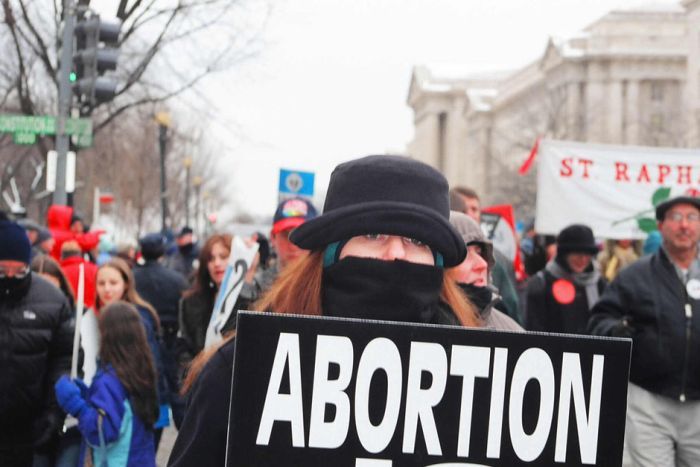Can you be feminist and pro-life? The question misses the point
Posted
The Women's March on Washington, attended by a crowd estimated to be about three times the size of Donald Trump's inauguration, carried with it a powerful, global message for women's equality and human rights.
The spirit of women's solidarity, however, was soon marred with controversy, on account of the reported exclusion from the march of pro-life women's groups and pro-life women in general.
The politics of the March, a peaceful demonstration which coincided with the anniversary of Roe V Wade and the dawn of a conservative new administration, was very much centred on a pro-choice platform.
While no pro-life women were actively excluded from the event, the inevitable question emerged as to whether women could be feminist and hold a pro-life position.
Yet as one placard by a pro-life feminist at the March read: "Abortion is a symptom of women's oppression, not a solution to it."
If this is the conversation that pro-life feminists are trying to generate in response to the politics of choice, then I for one am listening.
Viewing abortion as the key solution to women's inequality — or worse, as an empowering rite of passage, as one celebrity feminist recently suggested it was — risks masking the violent circumstances that often underpin such "choices" to begin with.
Of course a woman can be feminist and pro-life
It should be said from the outset that the question "can you be a feminist and pro-life" is not particularly clear.
The "pro-life" stance we have come to know is a political position. To hold that position is to actively promote or support legislation that prohibits women's access to abortion and other means of reproductive control.
To be a feminist is also to hold a political position — it refers to the liberation of women as a group from conditions of inequality or oppression.
It does not mean "whatever a woman feels like" or the "right to live out womanhood", as one pro-life woman told the New York Times last week.
It is political, and its politics in achieving the goal of equality will certainly vary.
In this sense then, a pro-life political position that fails to trust in women's equality, which places foetal rights above the mental and physical health of a woman, and doesn't recognise women in law as agents capable of making informed choices, is incompatible with feminist politics.
Having said that, to be pro-life — based on a personal objection to abortion — is not incompatible with feminism.
As Hillary Clinton said last year, of course a woman can be feminist and pro-life — but the question itself is misleading, because it ignores the complexity of the decision to terminate a pregnancy many women wrestle with.
Abortion isn't always 'exciting' or 'empowering'
Discussions about abortion in Australia have often mirrored those in the United States.
In 2015, for example, the #ShoutYourAbortion social media campaign encouraged women to speak frankly about their abortion in an attempt to de-stigmatise it.
Women in America explained how, "Exercising the right to control my fertility … made me feel like one of the luckiest women in the world".
 Photo:
In a podcast about abortion stigma, Lena Dunham said she hadn't had an abortion, "but I wish I had". (Reuters: Brian C Frank)
Photo:
In a podcast about abortion stigma, Lena Dunham said she hadn't had an abortion, "but I wish I had". (Reuters: Brian C Frank)
The campaign motivated Australian feminist Clementine Ford to raise the issue of abortion here: abortion access was "one of the cornerstones of women's liberation", she said.
Ford also encouraged Australian women to voice their stories, arguing that abortion was "simply a medical procedure, and deserves no more scrutiny and moralising than would the extraction of a cyst or tooth".
Women who shared their stories were celebrated as "unapologetic" and "defiant".
That may be the case for some. But this seemingly benign liberal position severely narrows the issue of women's reproductive health to one of choice, repackaging abortion not only as the solution to women's inequality, but as relief, empowerment, ownership and control.
Its "new" look is so enticing that celebrity feminist Lena Dunham recently said that she "wished" she had an abortion story of her own to share.
Given all the excitement and liberation to be had, can you really blame her?
The missed opportunity of 'choice' politics
The bigger problem with viewing abortion through the restrictive lens of "choice" is that the conversation completely sidesteps the reasons that may lead to an unintended or unwanted pregnancy in the first place.
Research has shown that between 6 and 22 per cent of women who seek an abortion also report experiences of intimate partner violence, in which that violence forms the basis for the decision to terminate the pregnancy itself.
Indeed, some men use forced pregnancies (through birth control sabotage, for example) as a tool of control to keep their partner from leaving them, or simply as continuity of their abuse.
Physical violence often begins when a women is pregnant, or can escalate if violence is already present in the relationship.
Pro-choice activists often point out that there are no significant causal links between terminating a pregnancy and women's depression.
What doesn't seem to get as much attention, however, is the fact that physical and emotional violence against women by a male partner is far more likely to cause depression than the decision to terminate a pregnancy.
When 'choice feminism' focuses solely on women's unrestricted access to abortion and contraception, it misses the opportunity to discuss issues like pregnancy coercion, men's refusal to wear condoms, and forced abortion — in other words, the limitations of women's choices in abusive circumstances.
The centrality of free access to abortion in this debate is not really a solution then, but rather a mask to the ongoing problem of men's violence against women.
Is it any wonder that women with such experiences, with choices that don't make them "happy", might not be "empowered" to "shout" them online?
Conversations I have had with women reveal the shades of pressure and coercion that occur even in a state like Victoria, which has the most liberal abortion laws in the country.
For example, a recently divorced woman with three children told me of her sorrow over an abortion of what would have been her fourth child.
She had gone for the routine diagnostic test that screens for foetal abnormalities, and the results — as well as pressure from her doctor and husband — practically made the decision for her.
She continues to mourn the loss of that potential baby and every year commemorates what would have been its birthday.
Beyond the 'pro-choice V pro-life' debate
Another friend, a married mother of four children, was distressed to find out she was pregnant again because her health had been compromised by the four caesareans she had previously undergone.
When she told her obstetrician the news and softly suggested an abortion, he brushed off her concerns and booked her in for a C-section — for a baby that she wasn't even sure she wanted.
In this way, feminist stories shouldn't only focus on removing the moral stigma of abortion, nor should the public conversation they spark be reduced to a tired pro-life versus pro-choice debate.
They should also be told to help to expose the pressure, coercion and abuse that can underscore reproductive decision-making in the first place.
Moving the discussion of women's reproductive health and rights beyond the perimeters of choice and empowerment through abortion, and into our national discussion on violence against women, is a step that both pro-choice and pro-life feminists in Australia can get behind.
Certainly, the success of the Woman's March on Washington is very inspiring.
But it also missed an opportunity to broaden the conversation about women's equality to include other perspectives that, while unthinkable for liberals, may have helped to unify and deepen the message of solidarity.
Rachel Hirsch is currently completing her PhD at the University of Melbourne. Her research examines the links between sexual violence and Australian football, with an emphasis on the intersections between sport, law, and culture. She has an avid interest in feminist theory and politics, and proudly lives in a home filled with cats.
Topics: reproduction-and-contraception, abortion, womens-health, domestic-violence, feminism










